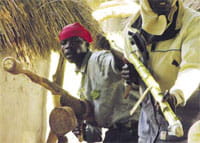The Church of Uganda Teso Diocese’s Planning and Development Office (COU-TEDDO) trains community volunteers as ‘Peace Promoters’. In 2005– 2006, COU-TEDDO trained 80 volunteers from the conflict-prone areas of the Teso region in north-east Uganda. The Peace Promoters use peace-building, mediation and counselling skills to address conflict and improve family relationships in their local communities.
Acknowledging that communities and society can only be changed by starting at the individual level, the Peace Promoters have the challenging task of ensuring that there is peace in their own families, before addressing community needs. This bottom-up approach has dramatically changed areas in which Peace Promoters exist.
There has been violence in Teso since the 1970s. Guns are readily available and Teso’s neighbours to the north, the semi-nomadic Karimojong tribe, use these weapons in cattle raids both among their clans and also with neighbouring tribes like the Iteso. Because of these raids, Teso communities have shifted from their traditional homesteads into internally displaced people’s (IDP) camps. Many children have grown up in these camps, knowing no other way of life.
In June 2003, the Lord’s Resistance Army (LRA), led by Joseph Kony, advanced into Teso, causing hundreds of thousands of people to flee from the violence. More IDP camps appeared with this increase in homeless communities. By 2007, the majority of families affected by this conflict had gradually moved back to their home villages. However, in parts of Teso which are vulnerable to Karimojong attacks, people still remain in IDP camps.
The Peace Promoters work within these different communities. In places where people are returning to traditional ways of life, the Peace Promoters assist in resolving domestic conflicts, land disputes, and other tensions. In border areas where violence continues, Peace Promoters are working in both Iteso and Karimojong communities. They report attacks and thefts and speak out against the tradition of cattle raids. They also work to solve disputes within families and communities.
Resolving conflict
Many Peace Promoters demonstrate initiative and personalise the work as they gain confidence in their skills and the positive reception of the community. Mohammed Lomong, a Karamojong Peace Promoter, leads Napak Peace Choir. This is a group of 70 young people who sing and perform dramatic presentations throughout Karamoja, urging their peers to leave their violent behaviour behind and live in peace. The Napak Peace Choir has been invited to perform at high-profile cross-border dialogue sessions facilitated by NGOs and government officials.
John Ogwel, a former Peace Promoter in Karamoja, was elected to a leadership post in the local government. He uses his position to speak about peace and to ensure that cross-border issues are resolved quickly. When tension increases and threatens to break communication between Teso and Karamoja, he calls cross-border meetings of his fellow Sub- County leaders to resolve the issues.
The Peace Promoters in Teso work together with COU-TEDDO to deliver radio talk shows on peace topics every other month. Recent topics have included reconciliation, gender issues, traditional peace-building practices and addressing rumour-spreading. These shows have proved to be popular. There are often so many calls from listeners that the Peace Promoters are invited to return and continue the discussions at a later date.
Gaining trust
Peace Promoters report that they are asked to help with local conflicts. Community members prefer consulting the Peace Promoters because their services are free, while the local government leaders often charge a fee for hearing a case. People feel that the Peace Promoters will listen more objectively because they are volunteer counsellors and have not been paid by anyone involved in the dispute.
Communities are slowly developing trust in their local Peace Promoters. In one village, two people argued after a drunken bicycle accident. Instead of causing injury, they decided to leave their bicycles with a Peace Promoter for the night and to come back the next day to resolve the conflict when sober. Another Peace Promoter reported that he had to hide a child in his house for several days because an entire clan wanted to kill the boy in revenge for the accidental death of his friend. That people are willing to trust such precious ‘belongings’ into the hands of Peace Promoters shows how well-known and trusted they have become in their areas.
Female Peace Promoters are gaining influence in a culture that listens mostly to elderly men. They report that they are now consulted on conflicts by men and women alike. One woman was able to stop a violent land dispute simply by standing between the quarrelling men and firmly asking them to calm down and talk instead of fighting. Later, those same men were able to settle the dispute by planting sisal along their boundary lines.
COU-TEDDO continues to assist the 80 Peace Promoters with follow-up training and support. Pastor Sam Eibu oversees this vital programme for COU-TEDDO. He explains the importance of the Peace Promoters: ‘The people themselves are the ones most likely to solve the conflicts in their community. We cannot be the ones to do it.’ One family at a time, the Peace Promoters work to see peace become a reality in their homes and neighbourhoods.
Esther Harder was Information Officer for the Diocese of Soroti in Uganda from 2005–2007.
COU-TEDDO, PO Box 107, Soroti, Uganda.
Email: [email protected]







